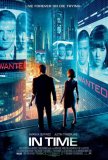In Time (United States, 2011)
October 28, 2011
Andrew Niccol is fascinated by the impact of futuristic technologies on society. His gripping feature debut, 1997's Gattaca, explored a civilization in which genetic tinkering rendered natural reproduction obsolete. With In Time, he is again looking to the future and wondering where another technological breakthrough might take the human race. And, while his conclusions aren't as compelling as in Gattaca, following the path that leads to them is not without its occasional pleasures, small though they may be.
The problem with In Time, to the extent that it is a problem, is that an intriguing premise turns into window dressing for a somewhat routine Bonnie & Clyde-meets-Robin Hood action thriller with car chases, heists, and gunplay. Take away the science fiction element and this is a routine story about lovers on the run robbing banks and distributing their ill-gotten gains to legions of the poor. In the end, this concept might work better as a weekly TV series than as a stand-alone movie. 109 minutes isn't sufficient time to delve into the inner workings of this society, and that aspect is what gives In Time an injection of originality. It's a little like Michael Bay's The Island in the way the narrative fails to live up to the promise of its back story.
The setting is indeterminate. It might be the future although, judging from clues in the story, it would have to be at least a century beyond today, and there's little evidence to support a 22nd century milieu. More likely, it's in an alternate reality, a parallel universe that has evolved similarly yet differently from ours. In this world, time literally is money. People live and age normally until they're 25 years old. Then, the aging process freezes and they have one more year before they die. A greenish digital clock on their forearm informs them (and everyone else) how long they have until death. Those final 365 days are a commodity. Time can be bought. sold, traded, and stolen by the clasp of hands. One hour might buy ten minutes with a hooker. Rent might cost several days. Wages are paid in hours and minutes. For the working class, it's a constant struggle to keep the clock from hitting zero. For the rich, with hundreds or thousands of years in the bank, life moves in slow motion - forever young and nearly immortal. The class differences are extreme.
Will Salas (Justin Timberlake) shares living quarters with his mother, Rachel (Olivia Wilde). They look about the same age, but Rachel is 50 and Will is 28. Both live day-to-day and, when Rachel underestimates bus fare and can't reach Will in time to get a "recharge" on her time, her clock expires. Meanwhile, Will rescues a wealthy stranger from a robbery. The mysterious man has more than a century left but claims he is tired of the monotony of existence and gives the rest of his time to Will. Coupled with his mother's death, this propels Will on a journey that takes him into the "zone" where the high rollers live. After a successful trip to a casino, he is invited to a party at the house of one of the world's wealthiest men, Philippe Weis (Vincent Kartheiser). When a Timekeeper (Cillian Murphy) corners him with an accusation of murder and theft, Will takes Weis' daughter, Sylvia (Amanda Seyfried), hostage, and goes on the run. She quickly turns from captive to accomplice and the two go on a crime spree stealing time from banks owned by Philippe and distributing it to the undertrodden.
In Time is allegorical in a way that even the most literal viewer could not miss. Still, when viewed on a concrete level, the concept of people using time as currency opens up some fascinating possibilities, especially when one considers that the government is complicit with the wealthy in keeping the poor so close to death that they are too busy scraping by to do anything rash. The "futuristic" landscape in which this transpires doesn't look all that different from today, except that the cop cars bear a passing resemblance to KITT from TV's Knight Rider (although they don't talk).
Justin Timberlake and Amanda Seyfried, capable actors with potentially strong screen presences, are criminally underused. They make a cute couple but aren't given much more to do than play a generic action hero and his equally generic love interest. They run, they shoot, they kiss, they play strip poker (of the PG-13 variety), and they run some more. The more In Time devolves into formulaic action, the less interesting it is. The film is more engaging and inventive during its first half than during its second, and the conclusion is muddled and rushed as time constraints force it to end before the audience's patience reaches zero.
Niccol has done better work. Gattaca offers a glimpse of how he can spin science fiction concepts into a complex web and Lord of War is an underrated action film with a satirical bite. Here, although the skeleton is overly familiar, at least he dresses it uniquely. Trying doesn't mean succeeding, but at least the effort is there. And, plot holes aside (and there are a lot of them), In Time slips by quickly enough. Still, those with 109 minutes available might want to consider spending it elsewhere.
In Time (United States, 2011)
Cast: Justin Timberlake, Amanda Seyfried, Vincent Kartheiser, Cillian Murphy, Olivia Wilde
Screenplay: Andrew Niccol
Cinematography: Roger Deakins
Music: Craig Armstrong
U.S. Distributor: 20th Century Fox
U.S. Release Date: 2011-10-28
MPAA Rating: "PG-13" (Violence, Profanity, Sexual Content, Nudity)
Genre: SCIENCE FICTION/THRILLER
Subtitles: none
Theatrical Aspect Ratio: 2.35:1
- (There are no more better movies of Vincent Kartheiser)
- (There are no more worst movies of Vincent Kartheiser)

Comments